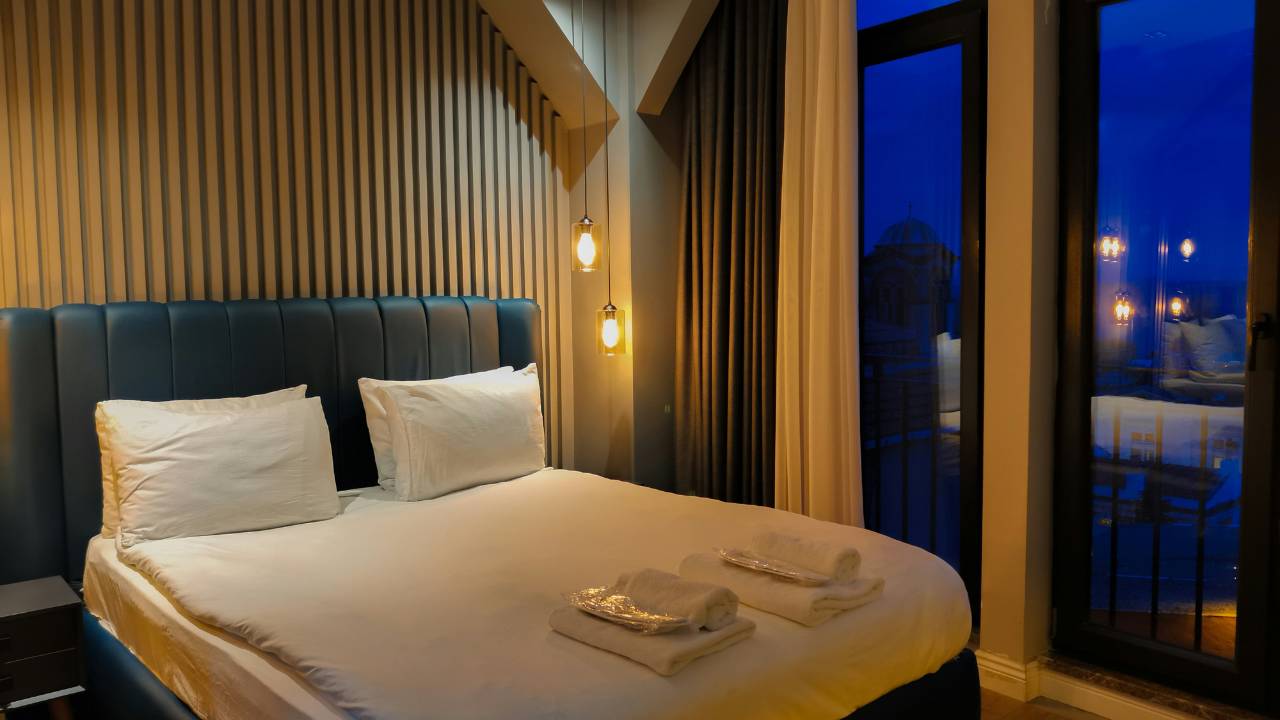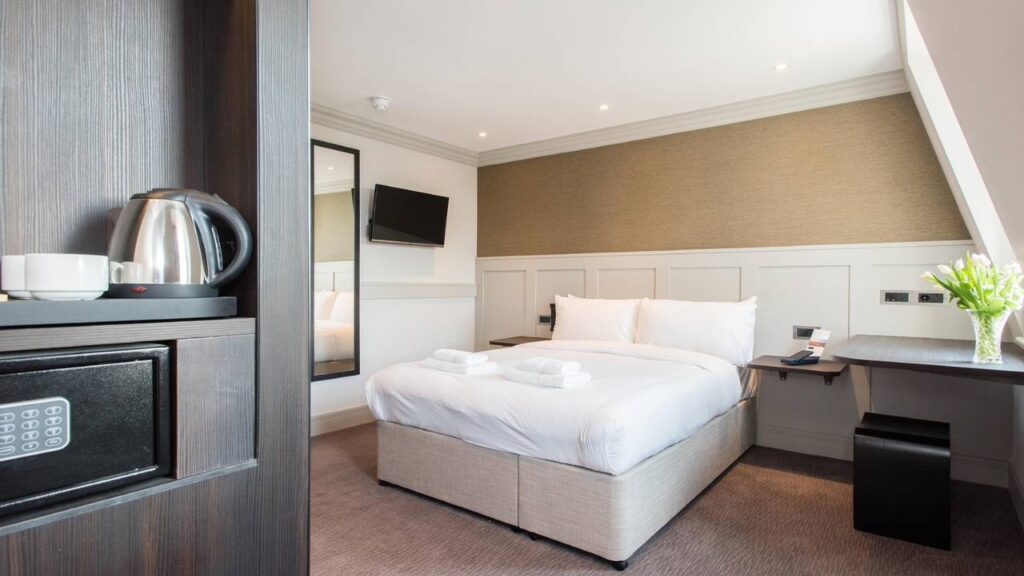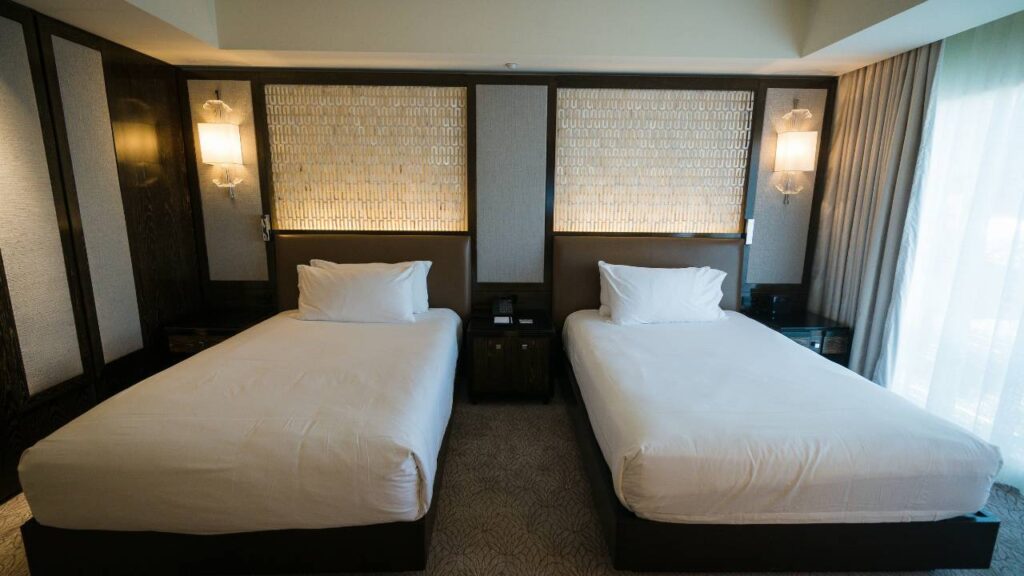
Selecting the right contract beds is essential for hotels, guest houses, and care homes, as these choices directly influence guest comfort, safety compliance, and the longevity of furnishings. Not only do high-quality contract beds meet strict safety standards, but they also withstand heavy, frequent use—critical in busy commercial settings where durability and reliability are non-negotiable. Thoughtful investment in these key features supports successful financial management and helps businesses build a strong reputation in a competitive market.
Feature #1 – Compliance with Fire and Safety Regulations
Ensuring contract beds comply with fire and safety regulations is essential for any business in the hospitality sector. Beds supplied to commercial settings should meet at least Crib 5 (Ignition Source 5) standards for fire safety. This certification is a legal requirement for hotels, guest houses, and other accommodation providers in the United Kingdom.
Crib 5 compliance means the bed’s upholstery and filling materials have passed rigorous fire resistance tests. These standards reduce the risk of ignition and slow the spread of fire, offering valuable time for evacuation if necessary. Proper certification documents confirming Crib 5 compliance should always be requested from suppliers.
Meeting these standards is not only about legal adherence. It also helps protect guests and staff during emergencies, reducing potential harm. Non-compliance can lead to severe penalties, including fines and invalidation of insurance, as well as damage to a business’s reputation.
Choosing beds that meet or exceed Crib 5 ensures peace of mind and demonstrates a commitment to safety. Responsible businesses consistently prioritise regulatory compliance to meet both legal and ethical responsibilities.
Feature #2 – Long-Term Durability and Structural Integrity

When selecting contract beds, long-term durability is a critical consideration. Beds must withstand frequent use and remain robust over time, making reinforced frames an essential feature in hospitality and commercial environments.
Frames constructed from steel or solid hardwood provide significant strength and sturdiness. Reinforced joints further enhance stability and can help prevent premature wear in high-traffic settings. It is advisable to check if the bed’s design incorporates additional supports, such as central rails or extra legs.
High-quality materials directly impact the structural integrity of a contract bed. Fabrics should be tear-resistant and easy to clean, while fillings and mattresses must retain their shape and comfort level even after prolonged usage. Research into the impact of long-term use on mattress firmness highlights the importance of quality materials in maintaining sleep comfort over time, especially in commercial environments.
Resistance to wear and tear is another important factor. Contract beds face daily stress from multiple users and frequent cleaning routines. Features such as scratch-resistant coatings, robust fixings, and durable upholstery can contribute to prolonged functionality and appearance.
A contract bed that maintains its structure and finish under demanding conditions will reduce the need for replacements or repairs. Investing in beds with proven durability standards will better serve establishments looking for reliability and performance.
Feature #3 – Comfort Without Compromise
Ensuring comfort is essential, even in environments where beds are used by many different people each night. Guests expect a restful sleep, whether staying for one night or an extended period. Good contract beds must balance durability with superior comfort.
Hospitality-specific mattresses, such as King Koil mattresses, are designed to be both robust and inviting. These products often combine multiple layers and tailored materials to offer long-lasting support, even with frequent use. The design considers both resilience and luxury to meet guest expectations.
One key aspect is effective spinal support. Properly engineered mattresses provide alignment for a range of body types, helping prevent aches or discomfort. This is especially important when a guest may sleep in an unfamiliar bed.
Pressure relief is another significant benefit. Advanced sleep surfaces are constructed to ease pressure on joints and reduce the risk of soreness, which is highly valued in high-traffic settings. This feature is critical for hospitality environments aiming to maximise guest satisfaction.
Suitability for frequent guest turnover must not be overlooked. Contract beds are meant to retain their shape and comfort over time, ensuring that each guest enjoys similar quality. The result is a consistently pleasant experience for every user.
Feature #4 – Versatility in Design and Functionality

Versatility is essential when selecting contract beds for any hospitality environment. Beds that offer multiple configurations, such as zip-and-link options, provide valuable flexibility. These allow operators to quickly adapt rooms for single or double occupancy without purchasing separate bed frames.
Integrated storage is another feature that maximises usable space. Drawers or lift-up bases enable efficient use of the room by providing discreet storage for bedding or personal belongings, which is particularly important in compact guest accommodation.
Modular bed designs are tailored to suit varying needs. They can be reconfigured or expanded as required, always maintaining a coherent look across the property. This adaptability helps ensure consistent guest satisfaction, even when room layouts or requirements change.
Practicality does not have to compromise aesthetic appeal. A well-chosen bed can blend in with different décor themes while still offering essential functionality. Choosing beds with flexible features supports long-term investment by meeting the evolving needs of both operators and guests.
Feature #5 – Customisation and Aesthetic Compatibility
A contract bed must offer flexible options to meet a property’s unique style requirements. Headboard styles in particular can shape the overall look, complementing both traditional and modern interiors. The option to choose different heights, shapes, or trims enables designers to align with a property’s existing décor scheme.
Fabric finishes are equally important when considering visual appeal and practicality. Selecting from a range of colours, patterns, and textures allows for beds that integrate seamlessly with other furnishings. Durable, stain-resistant fabrics ensure that longevity does not come at the expense of aesthetics.
Size variations are essential to cater for diverse spaces, from compact city rooms to expansive suites. This adaptability ensures that each room maintains a cohesive feel, no matter its dimensions.
When beds blend harmoniously with the interior design, the effect goes beyond mere appearance. Such visual consistency helps reinforce brand identity and plays a subtle but crucial role in building business reputation. Attention to customisation and aesthetics can make a lasting impression for guests and visitors alike.
Feature #6 – Ease of Maintenance and Hygiene

Hotels and healthcare facilities require beds that are simple to keep clean. Contract beds designed with removable covers allow housekeeping staff to quickly take off and wash the covers between guests. This reduces the time and effort needed for cleaning routines.
Many modern contract beds use anti-microbial fabrics as standard. These materials can help to minimise the risk of bacterial growth and unpleasant odours, making beds safer for guests and easier to maintain.
Beds featuring moisture-wicking layers can help to draw sweat and spills away from the mattress core. This helps to keep the sleeping surface dry and clean, further aiding hygiene.
Easy-to-clean components are important to meet hospitality health and safety standards. Materials that withstand regular washing and disinfecting also support infection control protocols.
Selecting a bed with these features helps maintain high hygiene levels while making maintenance tasks more manageable for staff. It also supports a professional image for hotels, hospitals, or care homes.
Feature #7 – Manufacturer Support and Warranty Coverage
When selecting contract beds, manufacturer support becomes a vital consideration. Reliable support ensures that assistance is available should any issues arise after purchase.
Clear warranty terms provide peace of mind by outlining what is covered and for how long. Buyers should review the conditions carefully to understand the level of protection and any exclusions.
Service agreements often complement manufacturer warranties. These agreements may include on-site repairs, spare parts provision, or scheduled maintenance, helping extend the bed’s lifespan.
Access to responsive customer support is an important feature to look for. Prompt communication with the manufacturer can lead to quicker resolutions and minimise disruption in commercial environments.
Working with trusted suppliers adds another layer of reassurance. Established suppliers are more likely to honour warranties and deliver consistent after-sales service, keeping contract beds functional and compliant.
Conclusion
Taking a strategic approach to choosing contract beds helps ensure long-term value, durability, and comfort. By weighing all relevant features before purchasing, businesses can better meet guest needs and regulatory requirements. Working with the best contract bed suppliers ensures access to products that meet high standards for safety, longevity, and design. Carefully selected beds contribute to both improve guest experience and operational efficiency, making them a worthwhile investment for any accommodation provider.

